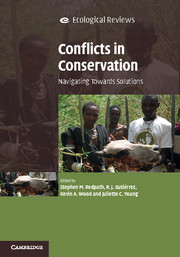Book contents
- Frontmatter
- Dedication
- Contents
- List of contributors
- Foreword by Georgina Mace
- Acknowledgements
- Part I Introduction to conservation and conflict
- PART II Contrasting disciplinary approaches to the study of conflict in conservation
- 3 The value of ecological information in conservation conflict
- 4 Environmental history and conservation conflicts
- 5 The political ecology of conservation conflicts
- 6 Understanding conservation conflicts: an economic perspective
- 7 Anthropological approaches to conservation conflicts
- 8 Law and conservation conflicts
- 9 The relevance of psychology to conservation conflicts
- 10 Conservation conflicts: ethical issues
- 11 A view from sociology: environmental movement mobilisation over old-growth temperate rainforests in British Columbia
- 12 Peace research and conservation conflicts
- 13 Linking conflict and global biodiversity conservation policies
- Part III Approaches to managing conflicts
- Index
- Plate Section
- References
12 - Peace research and conservation conflicts
from PART II - Contrasting disciplinary approaches to the study of conflict in conservation
Published online by Cambridge University Press: 05 May 2015
- Frontmatter
- Dedication
- Contents
- List of contributors
- Foreword by Georgina Mace
- Acknowledgements
- Part I Introduction to conservation and conflict
- PART II Contrasting disciplinary approaches to the study of conflict in conservation
- 3 The value of ecological information in conservation conflict
- 4 Environmental history and conservation conflicts
- 5 The political ecology of conservation conflicts
- 6 Understanding conservation conflicts: an economic perspective
- 7 Anthropological approaches to conservation conflicts
- 8 Law and conservation conflicts
- 9 The relevance of psychology to conservation conflicts
- 10 Conservation conflicts: ethical issues
- 11 A view from sociology: environmental movement mobilisation over old-growth temperate rainforests in British Columbia
- 12 Peace research and conservation conflicts
- 13 Linking conflict and global biodiversity conservation policies
- Part III Approaches to managing conflicts
- Index
- Plate Section
- References
Summary
I here outline the development of peace research as an area of study, analyse its current approach as an interdisciplinary field of work and discuss whether approaches prevalent within peace research are of value in relation to the resolution of conservation conflicts. Peace research is a discipline which endeavours to analyse and understand the roots and structures of conflicts, to prevent them before they develop, resolve them when they have commenced and engage in post-conflict peace-building.
Historical context
Prior to the Second World War, pioneering researchers studying the causes of interstate wars included Quincy Wright, Pitrim Sorokin and Lewis Fry Richardson. Their work attracted little attention until the early post-war period when peace research was boosted by the failure of conventional international politics to prevent two massive world wars in the space of 30 years, and it was further boosted by the advent of the nuclear arms race and the risk of a global nuclear catastrophe.
By the mid-1950s, peace research centres were being established principally in Scandinavia and North America, but with a persistent interest in Japan. A notable initiative was the establishment in 1957 of the Journal of Conflict Resolution, based at the Centre for Conflict Resolution at the University of Michigan, with the founding editors presenting two reasons for the need for such a journal:
The first is that by far the most important practical problem facing the human race today is that of international relations – specifically the prevention of global war. The second is that if intellectual progress is to be made in this area, the study of international relations must be made an interdisciplinary enterprise, drawing its discourse from all the social sciences and even further. (Boulding, 1973: 3)
The interdisciplinary call was reflected in the backgrounds of North American peace researchers including the mathematician Anatol Rapoport, the economist Kenneth Boulding, the sociologist Elise Boulding and the psychologist Herb Kelman.
- Type
- Chapter
- Information
- Conflicts in ConservationNavigating Towards Solutions, pp. 168 - 179Publisher: Cambridge University PressPrint publication year: 2015
References
- 1
- Cited by

